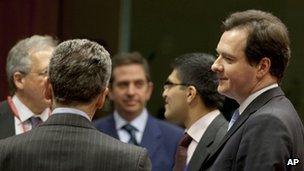Osborne stands alone as EU backs bonus cap
- Published
- comments

Chancellor George Osborne stood isolated after European Union finance ministers vowed to press on with proposals to curb bankers' bonuses.
He told a meeting of EU finance ministers that he could not back the plans, which he fears could damage London's financial centre.
The EU is proposing to cap bonuses to 100% of a banker's annual salary, or to 200% if shareholders approve.
There will be further talks, but all other countries backed the plan.
Those negotiations will take place over the next few weeks ahead of a a formal vote at the European Parliament in April, and the UK will hope to win some concessions as the details are finalised.
Supporters of the bonus cap need roughly a two-thirds majority to pass the legislation, however, meaning the new rules can come into force even with British opposition.
Speaking after the meeting, Mr Osborne said the UK already had the toughest regime in Europe for bankers' pay and bonuses and that a cap could "have a perverse effect".
Further talks
There were signs of support for the UK from Germany and Italy at Tuesday's meeting. German Finance Minister Wolfgang Schaeuble, for example, said "it would be better'' to reach consensus with the UK.
However, the UK chancellor can only really hope to tinker at the margins of the deal, BBC Brussels correspondent Chris Morris says.
EU officials say any alterations would have a pretty small impact on the total bonuses that can be paid.
Shadow chancellor Ed Balls said it was "no wonder" that George Osborne found himself outvoted 26-to-1 at Tuesday's meeting.
"He failed to engage with these sensible proposals to limit bonuses... until the very last minute," Mr Balls said.
"It shouldn't take the European Union to rein in excessive bonuses, but George Osborne has dragged his feet and refused to act in Britain."
The bonus proposals are part of wider measures requiring banks to strengthen their capital buffers in the hope of avoiding another financial crisis.
Michel Barnier, the EU commissioner for the single market, said high bonuses were behind excessive risk-taking by bankers. "Enough is enough. We've got to put a stop to that."
'Unintended consequences'
It is very unusual for a significant piece of financial legislation to pass without the backing of the UK, whose capital London is Europe's major financial centre.
The Mayor of London, Boris Johnson, has dismissed the bonus cap as "self-defeating". The City fears the rules will drive away talent and restrict growth.
Simon Lewis, chief executive of the lobby group the Association for Financial Markets in Europe, said the proposed measures were not just a threat to the City of London, but to Europe's competitive position in financial services.
He told the BBC: "If this goes ahead, you will see the law of unintended consequences. Salaries will go up, there will be less flexibility, and the banks will be less competitive."
Last week the Federation of European Employers questioned whether restrictions on bankers' pay exceeded EU powers.
There has been speculation that the UK may try to invoke a little-used "national interest" defence to block attempts to curb bonuses.
The so-called "Luxembourg Compromise" allows a member state to block a majority decision being taken if an issue is deemed to seriously affect "a very important national interest".
Some banks have reportedly taken legal advice on whether the EU's proposals are within the law, according to the Financial Times on Tuesday. One bank had already received legal opinion that the bonus measures contravened European law, the FT said.
Mr Lewis told the BBC that he "was sure" lawyers would be looking at whether the proposals were lawful, but added that "these are early days".
The European Commission has said that it is confident the proposals are legally watertight.
- Published28 February 2013
- Published28 February 2013
- Published28 February 2013
- Published28 February 2013
- Published4 March 2013